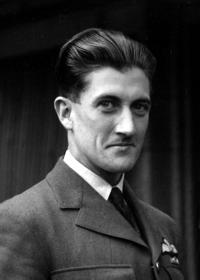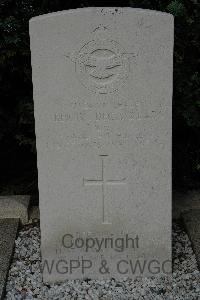Cemetery: Scheemda Protestant Cemetery
Country: The Netherlands
Area: Groningen
Rank: Squadron Leader (Pilot)
Force: Royal Air Force
Official Number:
Unit: 501 Sqdn.
Country of Service: British
Details: Joseph Berry was born on the 28th of February 1920, the second child and eldest son, his Father was Arthur Joseph Berry, and his Mother was Mary Rebecca Charlton, he had a younger brother Jack and an elder sister Ivy, their home address at that time was 55 Ramsey Street, Tursdale, Cassop, Near Ferryhill, County Durham, today Cassop cum Quarrington, Teesdale, about 11 miles East of Crook County Durham. Joseph’s first taste of RAF life started after he had enlisted on the 8th of August 1940, at No 9 Aviation Candidates Selection Board (A.C.S.B.) where he was recommended for training as a Pilot/Observer. Joseph was destined for fighter training and after flying solo in a Miles Master in February 1941 he was again on the move, his next posting was to No 9 Service Flying Training School (S.F.T.S) on the 16th of April 1941, at this time the school was based at Hullavington in Wiltshire, using Castle Combe and Babdown Farm as relief landing grounds, here Joe got a taste of some serious flight training. With his wings on his chest from the previous month his next move was to Crosby on Eden in Cumbria on the 7th of July 1941, this place was the home of No 59 Operational Training Unit (O.T.U.), part of No 81 Group housing Hurricanes and Miles Masters, this area was near what is now the present Carlisle Airport. For his unmatched skill and hard work Joseph was later promoted to Squadron Leader and was given command of his own squadron, dedicated to the defeat of the flying bombs by night. Joseph’s marksmanship had became so accurate that on at least two occasions he destroyed a flying bomb with the expenditure of only 60 rounds, while most pilots used up hundreds of rounds on one flying bomb alone, with the rounds per minute rate of his 4 Hispano 20mm cannons, 60 rounds fired meant, just over a one second burst on the gun button. With a total of 60 flying bomb kills to his name Joseph was acknowledged as the record flying bomb killer, he was summoned to the Ministry of Information building in London for an Anglo-American “High Level†conference with members from the American Air Force, Royal Air Force, Balloon Command, the Observer Corps, Anti Aircraft Gunners and A.T.S. involved in the battle of the flying bombs. They were told by Mr Duncan Sandys M.P. chairman of the Cabinet Committee on operational counter-measures against the V1’s, what was still expected of his squadron; even though the Government believed that the flying bomb threat was all but defeated. As fewer and fewer flying bombs were being ground launched against Southern England due to the allied advances in the Pas-de-Calais area, and the capture of the flying bomb launch sites further in land by the 4th of September, the 501 Squadron boys had little to do, so the squadron and its echelon were moved to Bradwell Bay in Essex; near Southend on the 22nd and 23rd of September. At Bradwell Bay; the decision was made to check out the airfields were bombers with flying bombs attached were coming from, with the intentions of having a ‘look’ at these various enemy airfields, this was to be the first sortie of its kind for these pilots. Crossing the Dutch coastline at first light at Egmond aan Zee, three miles South of Bergen; and at a height of 50 feet; low enough to avoid being detected by enemy radar, they then flew in the direction of Mappel, a slight turn North East brought the three Tempests on a heading towards Veendam. At approximately 07:10 hours while flying low on their planned route, bursts of machine gun fire from alerted soldiers stationed at the German Radar Site ‘Gazelle’ just East of Veendam, unluckily struck him and the side of his airplane rupturing the glycol tank of Joseph’s Tempest. His two companions saw him slumped over the controls of his airplane and franticly radioed him to pull up, struggling to control his stricken aircraft, some eyewitness reports say ‘that he’ increased his height’, presumably in an attempt to bail out, ‘leaving a glycol vapour trail in his wake’ He then radioed to his fellow pilots in the truest RAF tradition ‘Carry on chaps, I’ve had it’. Just over 2 miles to the East of ‘Gazelle’ Joseph's airplane flipped over on to its back and pan-caked down onto farm land near the hamlet of Kibbelgaarn, the two other pilots circled the crash site a couple of times to see if their commanding officer had survived the impact, but the Tempest was now seen to be burning fiercely, so the only thing left for them to do was to carried on with their mission. Joseph was buried in a quiet plot in the nearby civilian cemetery of Scheemda, on the simple wooden cross were written the words, ‘Unknown RAF’. In the September of 1956 the Commonwealth War Graves Commission erected a permanent head stone, the text on the stone was chosen by Joe’s widow Joyce. ‘GREATER LOVE HATH NO MAN THAN THIS, THAT A MAN LAY DOWN HIS LIFE FOR HIS FRIENDS’ The grave is situated in Scheemda Protestant Grave Yard Plot 2, Row 5, and Grave1. Scheemda is located 32km east of Groningen. Years of effort by Mr Chris Timmer a local historian to have a lasting memorial in Holland dedicated to Joseph’s memory, culminated on the 20th of August 1999, a ceremony to commemorate Joseph’s heroism, by the unveiling of a Granite Plaque on the cemetery wall where he is buried, was held. English translation of Cemetery Wall Plaque. In memory of Squadron Leader Joseph Berry DFC and 2 Bars who died on the 1st of October 1944 in the hamlet of Kibbelgaarn. He shot down 60 V1’s in WW2 and doing so saved the lives of many people during those difficult days. He gave his life for our freedom. Other pilot’s comments about Joe. Roland Beamont, 150 Wing, “He was a fine man, a brilliant fighter pilot and a determined and courageous leader, I always thought he should have received a D.S.O.†Bryan Wild, 153 Sqn, “There is no doubt in my mind that Joe was a really outstanding pilot, and deserved greater recognition of his bravery than the DFC and Bars. It was a privilege to be a friend of this fine servicemanâ€. Jimmy Grottick, 501 Sqn, “Joe was mental; he was the living proof that there are old pilots and there are bold pilots, but there are no old bold pilots. He was a fine pilot and his death created an enormous void in the squadronâ€. Gerry. G. Page, 252 Sqn, “Joe was good, but you had to be good to stay aliveâ€. Hugh Vernon, 501 Sqn,†He was a quiet unassuming man, with a good sense of humour. His enthusiasm motivated the whole squadronâ€. Douglas Palmer, 3 Sqn, “What a guy, the nation owes men like Josephâ€. Gilbert Wild, 501 Sqn, “501 lost an outstanding pilot and Commanding Officerâ€.
Photograph by Gerrit Bouma/ Martin Shilton / Graham Berry



